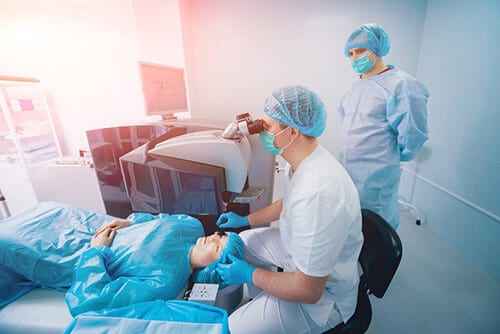
As laser vision correction with LASIK becomes more popular, a fair amount of misinformation is perpetuated about the surgery. It is possible this misinformation prevents people that could greatly benefit from surgery from seeking treatment. In an effort to help educate potential candidates about LASIK, the team at Eye Care of San Diego debunks some of the most common myths below.
LASIK is painful or uncomfortable.
Our LASIK team takes precautions to prevent you from feeling pain or discomfort. Numbing drops will keep your eyes comfortable during the procedure. We can also give you a mild sedative medicine to relax you. Although you will feel some pressure while the corneal flap is being made, it should not be painful.
There is no long-term safety data on LASIK.
LASIK technology was developed more than 30 years ago and the first LASIK patient was treated in 1987. Since then, millions of people have had LASIK successfully. To date, serious complications are very rare.
LASIK cannot correct astigmatism.
LASIK is often used to correct astigmatism. By removing microscopic bits of tissue, the excimer laser improves the cornea’s curvature to improve the way light enters the eye and focuses on the retina.
The technology used is more important than the surgeon performing the procedure.
The most important factor in laser vision correction surgery is the experience and competency of the surgeon. How long a surgeon has been performing LASIK, how often they perform LASIK and their success record are extremely relevant. In inexperienced or unskilled hands, LASIK technology is more likely to fail to deliver the desired outcomes.
Dry eye is to be expected after LASIK.
Dry eye and other side effects like glare at night are common after LASIK. However, they typically resolve after a few months and are very rarely permanent.
After you have LASIK, you’ll never wear glasses again.
LASIK significantly reduces or eliminates the need to wear glasses or contact lenses for refractive errors. How much a patient needs visual aids after surgery is highly dependent on the individual, how well they heal and how severe their prescription was before surgery.
Also, LASIK does not prevent other age-related vision problems, such as presbyopia or cataracts, from developing. It is possible to need glasses or contact lenses to compensate for the progression of normal aging changes within the eyes.
Schedule a LASIK Consultation at Eye Care of San Diego
If you’d like to be evaluated for LASIK surgery, please call (800) 765-2737 or email Eye Care of San Diego and request a consultation today.







